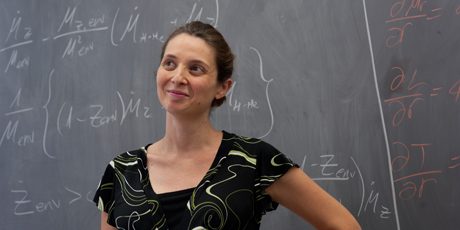Navigation auf uzh.ch
Navigation auf uzh.ch
Prof. Dr. Ravit Helled
A science team member of NASA’s Juno, Cassini and PLATO 2.0 missions and ESA’s JUICE mission Ravit Helled augments further UZH’s position in space sciences.

Website Prof. Dr. Ravit Helled
Career
A science team member of NASA’s Juno, Cassini and PLATO 2.0 missions and ESA’s JUICE mission Ravit Helled augments further UZH’s position in space sciences. Her research focuses on planet formation and evolution, planetary interiors, solar system exploration and extra-solar planets. Before joining the UZH Helled first was an assistant professor and then an associate professor at Tel-Aviv University. Prior to this she had spent four years as a postdoc and assistant researcher at UCLA. The Israel born scientist’s fascination for space goes back to a high school project with her physics teacher. Ever since she has been intrigued and fascinated by astrophysics. Originally she had planned to study industrial and management engineering because she likes working with people, but then decided to give physics a try. Helled is a mother of an almost ten-years old daughter and expecting a son soon.
What made you reconsider your original study subject?
Ravit Helled (R.H.): I was a technical kid, I liked to explore. Despite the fact that I had a major in physics and literature in high school, I was somewhat reluctant about studying physics and therefore planned to study industrial and management engineering. I was intimidated by the idea of studying physics having all those geniuses around me… But then I reconsidered and told myself: « I do not want to be sixty and regret. I start, I can always change subjects if things do not work out.»
Well, things did work out. How was your time as a student?
R.H.: It was fun and fascinating. I had a great professor in planetary science and it was soon clear to me, that this was what I wanted to do.
What made this professor so unique?
R.H.: He was always open for discussions in class, following and nourishing the curiosity of the students.
What has brought you to Zurich?
R.H.: I have met astrophysicist Lucio Mayer (from the Dept. of Computational Science, UZH) on several occasions. Switzerland is very involved in extrasolar planets and astrophysics research, especially now with the National Centre of Competence in Research (NCCR) PlanetS. There is the International Space Science Institute in Berne. So for an astrophysicist Switzerland is definitely a great place to be.
You are a successful scientist and a professor, you are married and a mother: How did you manage to bring all this together?
R.H.: This is definitely challenging, but my husband, who is a professor in theoretical physics in Freiburg (Germany), and I have decided that we both would not compromise personally and professionally.
With what you have accomplished you clearly are a role model for young people. But did you have a role model yourself?
R.H.: My mother had a career and three kids. So I grew up in an environment that was not `either this or that’. I had amazing professors during my undergraduate studies, then very supportive PhD and postdoc advisors, and that was also very encouraging.
Why should one study physics?
R.H. : You learn how the world works and are able to crack interesting problems. It is creative and becomes even more interesting when you move to higher levels.
What would you advice a PhD student considering an academic career?
R.H.: If you want it, go for it. Don’t worry about the future and finding a job. These are going to be the best years of your life.
Any special advice for the young girls out there?
R.H.: Do what you like best. Don’t set yourselves limits, everything will be possible.
Contact:
Center for Theoretical Astrophysics and Cosmology
Institute for Computational Science
University of Zurich
Winterthurerstrasse 190
8057 Zurich
rhelled(at)physik.uzh.ch
Calista Fischer